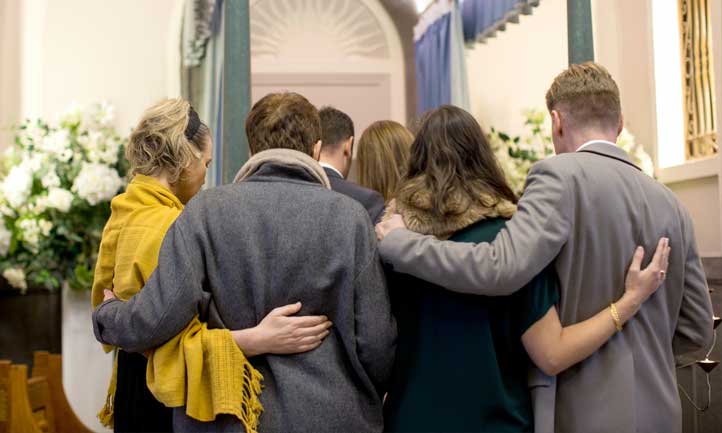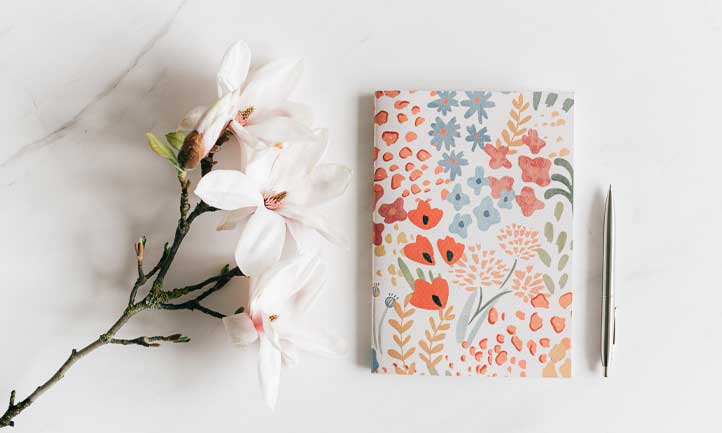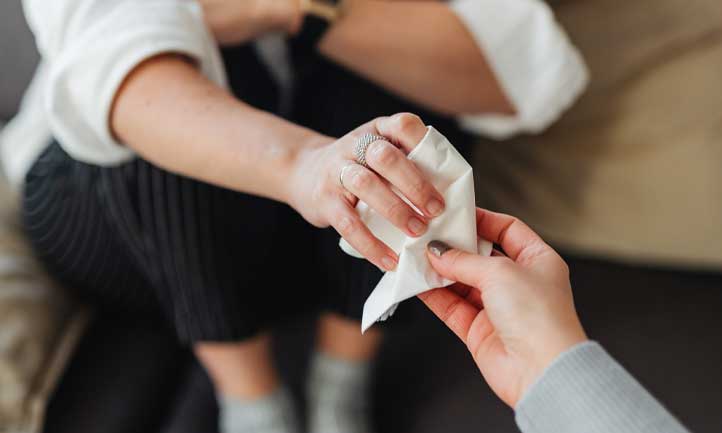An Etiquette for Grief
Author: Crystal Gromer
This article was previously published in the March 1996 issue of Vogue magazine and the Summer 1996 issue of TAPS Magazine.
On a hot night in July 19 years ago, my husband Mark died. He was 24 years old. He was smart and witty and bright, he had thick brown hair that he pushed off his forehead and that shone auburn and a little gold in the light, and he loved me, of that I have no doubt. In all the pictures I have of him, including the ones with my dog, he looks like he has just said something very funny. We were married for nine and a half months.
At one precise moment, chronicled somewhere on a death certificate, I lost my world, my geography, my language, although I didn’t lose my life, as Mark did. Standing in a world where the distinction between life and death seemed a thick, uncertain boundary, I was not prepared, as no one can be. This is not a trip you can pack for. Grief is utterly lonely.
 Photo: Unsplash.com
Photo: Unsplash.com
“What can I do?” people asked me.
“Thank you,” I murmured, not knowing what to say and trying to reassure them. The truth is there is nothing anyone can do. None of us can boss around life and death. We can’t do the one longed-for thing: make the dead person stop being dead. “What can I do?” I asked recently when, out of the blue, the phone rang on a sunny weekend afternoon and the news came of a friend’s death. There is a disconcerting gap in being, suddenly, an outsider. Do I call or write? Do I stop by the house? Do I bring flowers? Food? How close a friend am I? Am I intruding?
In other cultures and at other times, we would know what to do: If I were a Thonga woman in South Africa, I would join the other women wailing on the ground; or if I were a Chippewa, I could paint my face black, or just parts of it, depending on the depth of mourning; in other places in the world, I could wear shabby clothes, shave my head, go unclean, believe in ghosts. I could offer the consolation of an afterlife. My Irish Catholic grandmother sat in her kitchen with her holy cards; “God rest her soul,” she sighed.
But these are not the rites of our time and our place. Even religious traditions do not help with the social questions: whether to call, what to say, what to avoid saying. Because these questions came early to me, I have spent a good deal of time thinking about them. There is an etiquette of grief we can learn. It is not so much a set of rules as a way of being. It requires accepting a place of sadness, for something that cannot be fixed. Because of this, it runs counter to a set of cultural assumptions that we have to unlearn first.
Americans are inclined to think we can always start over, a legacy of the 19th-century belief in the ever-expanding frontier we are entitled to: Like Huck Finn, we can always “light out of the Territory.” When Alex de Tocqueville visited the United States in the 1830s, he concluded that “equality of conditions” here bred belief in human perfectibility, in “indefinite faculty for improvement.” Self-help books and 12-step programs and talk shows tell us we can do it! We really can have perfect thighs. We can stop our addictions. We can learn Spanish in five easy lessons, learn to cook with beans. In the same spirit, we tend to treat grief as a condition, something to be fixed quietly, off-stage, in somebody’s office for 50 minutes a week, with medication. It’s as though our model for grief is a bad root canal. First it’s terrible, then it gets better, then it’s over. The requisite stages achieved, everyone can breathe a collective sigh of relief when the spouse remarries, the partner finds a new partner, the couple has another child: all signals that the grief has ended. It could all fit comfortably into a TV movie.
This palliative urge is hard to subdue. None of us wants to see a friend suffer. We want to help. You should go out, we say, see a movie, have lunch with a friend, buy some new clothes. It would be more helpful to offer companionship: Would you like to rather than you should. It’s too easy to fall into judgment, especially when friends talk to friends, and sympathy conspires: She should get more exercise; if she just threw herself into work; if she didn’t work so hard; she should really try medication, yoga, massage therapy, eight glasses of water a day. She should be over it by now.
American optimism, in the context of grief, is simply bad manners — so are cliches. “Time heals all wounds,” a friend repeated to me recently at another friend’s memorial service, and in the course of that afternoon, more than one mention was made of that great healer, time. But if we really thought about that word, heal, instead of just digging it out like a dime, we’d know what a terrible process healing is, how hurtful and how uncertain. The results, whenever time does bring them, aren’t always great. If two years after a rollerblading accident my left thumb has not regained its ability, then what can be said about the state of my soul after a friend’s death, after my husband’s?
We try to minimize grief. “At least he didn’t suffer,” people say. “At least he’s not a vegetable.” Anytime you hear “at least” come out of your mouth, stop. Creating an imaginative worse scenario doesn’t make the real and current one better; it trivializes it. “At least you’re young,” people said to me. “At least you have your life ahead of you.”
“What?” I thought, “So this doesn’t count?”
Besides, at 24 I felt ancient; hearing that I had my life ahead of me only reminded me that I had to slog through perhaps 50 years, every single one without Mark. The language of comfort wants to ameliorate. That’s fine if the misfortune is a bad haircut, a lost job. But the one thing you have when you’re grieving is grief; the rest of us need to acknowledge the importance of that and let it be, not try to make it disappear.
After Mark died, I felt as if people saw me as a tragic heroine, a young widow. People tended to look at their hands when they talked to me, which they did quietly, almost as if I were a restive animal. They were only trying to be kind, their voices softened to show they understood. But they seemed to be speaking only to their image of me. I felt lonelier for being still myself, a self no one else wanted to know, for knowing would provide a glimpse of how painful grief is, and how ordinary, like water. Like water, it will fall on us all sometimes.
An etiquette for grief should tell us more than what not to do; it should tell us what to do as well. We can lend ourselves out.
 Photo: Unsplash.com
Photo: Unsplash.com
We should go to the funeral or memorial service, no matter how much we don’t want to go, in order to swell the ranks, to be one member of a community mourning an irreplaceable person. Several times in the past five or six years, I have been to funerals and have been surprised by how few of the person’s colleagues are there, as though it weren’t an obligation, as though it was enough to read the notice. The church, hall, room — my neighbor’s father’s memorial service was in an indoor riding arena — should be full of human faces, human sounds. Chances are your individual presence won’t be noticed. But together, all the people who attend the ceremony made the ceremony. Your presence represents a part of a life and it becomes a part of a memorial.
When you write a note — you should write a note, and never, ever, simply sign a greeting card — don’t begin with “Words cannot express”; you’re using words, poor and necessary things that they are, so don’t use them to express a vague sense of your own grief. Write down a memory of the person who has died as clearly and exactly as you can. This is what you can give, and it is a gift, another picture. It is never too late to do this, so don’t allow yourself the excuse that a month has passed, two months, more; write anyway. At my college reunion, a woman I’d never known at school, but who knew Mark, came up to me to talk — only a minute or two — about her memories of him. Hearing her recollections 17 years later felt wonderful because often I think Mark is only a phantom. I wonder if he ever existed; I can no longer remember what his voice sounded like or the feel of his hand on my head. Often, I think, we refrain from saying something truly meaningful because we’re afraid it will hurt. Of course it hurts. Pain is not the worst thing in the world, and this is the lesson the grieving person lives. Embarrassment is not the worst, either, and that should be the lesson for those of us who would like to help. Evasion is worse. Forgetting is worse.
 Photo: Pexels.com
Photo: Pexels.com
 Photo: Pexels.com
Photo: Pexels.com
We can lend our presence at the funeral; we can lend our memories afterward; and we can continue lending ourselves and our services. After Mark died, I remember wishing that people still wore mourning. For most of us, I expect, that calls up only the image of Scarlet O’Hara dancing scandalously in black, the merry widow. But I wished for something that stood between me and the world. Clothes would have worked, so clearly obvious that even from far away, people would know I was in a different state from the rest of the world: “Watch out for me,” my clothes would announce as both a plea and a warning.
It’s hard to know what to say to an acquaintance who is grieving. There’s the first day back at work, the chance meeting at the dry cleaner. Sometimes the panic of doing the wrong thing takes hold. But don’t scoot down a nearby aisle of the drugstore or walk out another door of the train; don’t avoid someone. You’ve been spotted, no doubt; the memory of that failed moment, however fleeting and unintentional, endures on both sides. You don’t have to begin a conversation with “I’m so sorry.” You can say quite simply, “I’m so glad to see you,” “I’m so glad to see you out,” or “I’m so glad to see you’re back.” That’s enough.
I do not have anything good to say about suffering. Comfort is another matter. The giving and receiving of solace, the very vulnerability of opening ourselves to it, despite embarrassment, despite potential rejection, seem to me the most deeply human of activities. These lessons are learned rather than instructive. They are difficult rather than easy. An etiquette for grief should help us to live with what is hard as well as to share what is heartfelt.
Photos courtesy of Unsplash and Pexels.
